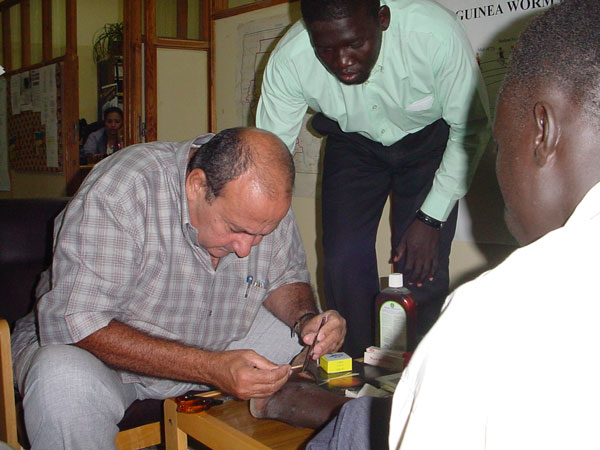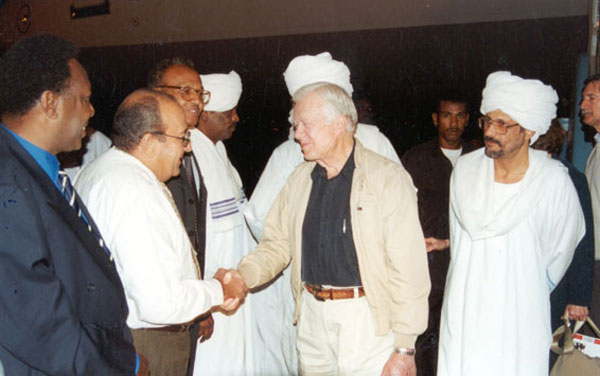Ask about the time he nearly died from cerebral malaria during a Guinea worm surveillance trip, or his supervisory visit to a town under siege, or the nights he spent stuck in a car with no food, little water, and once with three flat tires, and Dr. Nabil Aziz Mikhail will tell you he doesn't like to sit in his office.
"Unless you go to be with your workers in the field and unless you talk to them, things will not move," says the Carter Center country representative for Sudan, based in Khartoum.
Nabil has never been shy about navigating obstacles. The Ministry of Health named him Sudan's national program coordinator for Guinea worm eradication in 1994, at a time when the country reported about 2,000 cases of Guinea worm disease. The actual number of cases, as Nabil would later discover, was more than 118,500. Nabil had the courage to revise the figures upward, even though the fallout meant the country would have to admit a gross under-reporting of the number of cases and substantially increase the scope of work towards elimination. Much of that would have to take place in rebel-held territory in southern Sudan.
Dr. Donald Hopkins, vice president of the Carter Center's health programs, first met Nabil in 1994. He says, "From the beginning, Dr. Nabil was focused on doing what was necessary to stop Guinea worm disease. His dedication and effectiveness were respected by Sudanese and international health workers on all sides of the civil war."
When The Carter Center began leading the effort to eradicate Guinea worm disease in 1986, there were an estimated 3.5 million cases worldwide. Today, fewer than 1,000 cases remain in just a handful of countries in Africa, and it is poised to be the next human disease to be wiped out. But in 1995, when Sudan was becoming aware of how widespread the problem was, it was virtually impossible to reach the most endemic areas of southern Sudan while the country was involved in what was considered at the time Africa's longest civil war. Nabil and others in Sudan's Ministry of Health hoped President Carter and The Carter Center could help their budding elimination program, and invited him and representatives from eight neighboring countries to a national conference on Guinea worm. Carter accepted the invitation.
 Nabil works to remove a Guinea worm from the ankle of a man in Sudan in August 2002. (Photo Credit: The Carter Center/Mark Pelletier)
Nabil works to remove a Guinea worm from the ankle of a man in Sudan in August 2002. (Photo Credit: The Carter Center/Mark Pelletier)
What happened next is legendary. Nabil remembers it like this: "We met one day in the conference; the same evening President Carter left for southern Sudan, and the next morning the cease-fire was announced." Nabil was as surprised as anyone. "This was a dream," he says. "I've never heard of a health activity that brought any sort of cease-fire or stopped fighting or anything like that."
President Carter had negotiated what would come to be known as the "Guinea worm cease-fire," opening an unprecedented six-month window allowing health workers into previously inaccessible, war-torn areas to not only treat patients and track cases of Guinea worm disease, but also provide treatment to battle river blindness; vaccinate children against polio, measles, and other diseases; and deliver much-needed vitamin A. "It was the beginning of developing coordination between north and south Sudan," says Nabil.
Dr. Ernesto Ruiz-Tiben, director of the Carter Center's Guinea Worm Eradication Program, believes Nabil's demeanor, prudence, and ability to navigate Sudan's intense political sensitivities helped propel that coordination, particularly in the South. "Nabil gained the respect of many, including the southern Sudanese, contributing to him being an effective national program leader," says Ruiz-Tiben. "Carter Center staff and partners throughout the country and beyond lauded him for his honesty, wisdom, tenacity, and hard work."
Northern Sudan celebrated the last case of Guinea worm disease in 2002. Nabil witnessed the decline of the number of cases in South Sudan - today an independent nation - to just a few thousand as he continued to coordinate the national eradication effort until 2007. That's the year he retired from the Ministry of Health, joined The Carter Center, and began devoting his attention to wiping out river blindness in the vast and isolated Sudanese area of Abu Hamad in River Nile and Northern states. Together with the national program and partners, such as Lions Clubs International Foundation, The Carter Center worked with community-selected volunteers to revitalize the nine-year control program and dared to strive for elimination. Even though endemic countries in Latin America have stopped transmission of river blindness, many public health professionals doubted transmission of this debilitating disease could be eliminated in Africa.
 U.S. President Jimmy Carter greets Dr. Nabil Aziz Mikhail in March 2002 during the seventh annual Guinea worm eradication gathering held in Khartoum. (Photo Credit: The Carter Center)
U.S. President Jimmy Carter greets Dr. Nabil Aziz Mikhail in March 2002 during the seventh annual Guinea worm eradication gathering held in Khartoum. (Photo Credit: The Carter Center)
Nabil says the idea is no longer far-fetched. In May 2012, Sudan announced that Abu Hamad broke transmission of river blindness. This comes on the heels of news that neighboring Uganda recently stopped the disease in three focus areas.
"The good reports you are hearing from Latin America, the good news you are hearing from Uganda, and now Sudan, those who were not believing in elimination, now they are starting to believe that it is possible," he says.
Nabil admits it's tough-waiting for the day when Guinea worm will be eradicated from earth and river blindness will be eliminated from the few remaining areas in Sudan. Yet the momentum to wipe out ancient scourges continues, as The Carter Center and the ministry of health actively pursue the elimination of blinding trachoma in the next few years. Nabil is holding out hope that it won't be too long before he hears the word he has been waiting for.
"Once you say zero," he says, "this will be a great day for me and my country.
Please sign up below for important news about the work of The Carter Center and special event invitations.